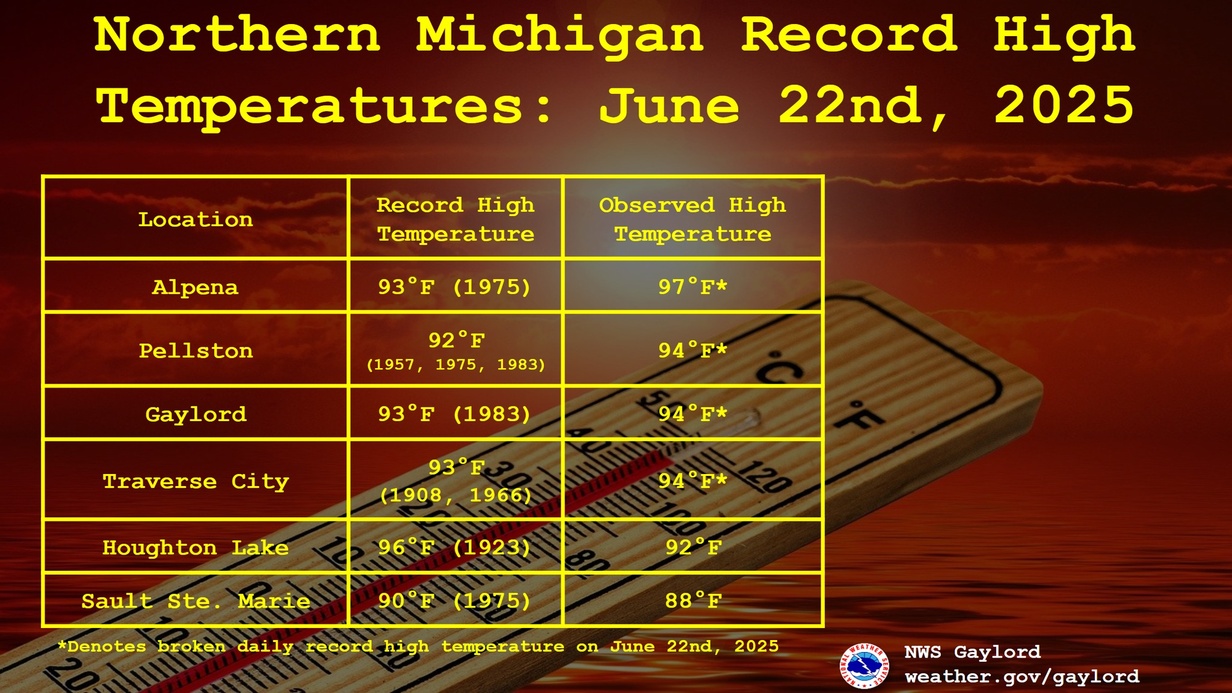
Why Did This Week’s Run Of 90-Plus Degree Weather Cause So Much Trouble In Traverse City?
By Craig Manning | June 27, 2025
Temperatures in Traverse City hit 94 degrees on Sunday, breaking a record that stood for nearly six decades. Historic temperatures weren’t the only things this heatwave broke, either. From bars and restaurants to plant nurseries to the Traverse City Governmental Center, issues with overtaxed cooling systems caused closures all across the region. So is northern Michigan getting hotter, and can we handle the heat?
By Traverse City’s standards, 2025 has been a relatively cool year so far. Temps only cracked 80 on four days between January 1 and May 31, and only three times the first two weeks of June. But last weekend brought a heatwave, taking the mercury into the 90s for the first time all year on Saturday (with a high of 91) and pushing it into record territory on Sunday. Traverse City’s previous record for June 22 was 93 degrees, recorded in both 1908 and 1966.
While TC typically gets a few heatwaves per year – last year saw a trio of three-day stretches in the 90s, one each in June, July, and August – the one this week test the area’s mettle. On Sunday, Brady’s Bar, The Parlor, Firebird Pizza and Steve's Smokin' BBQ, De Food Truck, and Ames Street Café in Elk Rapids all announced early closures, most citing air conditioning systems that couldn’t “keep up." Ames Street Café posted on Facebook that temps in its dining room were hovering near 90, while De Food Truck called it a day after the temperature inside the truck hit 134 degrees.
A pair of local plant nurseries – Bright Lane Gardens in Lake Ann and Wild Juniper Nursery in Cedar – also closed due to the weather. “With the expected high temps it’s just not safe to have people out in our greenhouses,” the former explained in a Facebook post.
The closures continued Monday, when Grand Traverse County and the City of Traverse City issued a joint announcement that, “Due to an electrical malfunction impacting the building’s cooling system,” the Governmental Center would be closed for the remainder of the day.
Monday clocked a high of 93 degrees in Traverse City, shy of the record of 96 set in 1930. The National Weather Service Gaylord office still called it “another blowtorch of a day across the Northwoods,” and reported new daily records in Alpena, Pellston, and Gaylord.
So, is northern Michigan is getting hotter? We crunched the numbers on Traverse City’s records, and found a mixed answer. Recent years have set their share of records. According to Extreme Weather Watch, which tracks records based on NOAA data reaching back to 1896, 2024 notched 15 all-time daily high temperatures – the second most of any year on record. 2023, meanwhile, is tied for fifth, with nine record hot days.
Dig deeper, though, and the results are complicated. Of the 365 days on the calendar, only 124 have all-time high temperature records from this century, and the majority of those have come in the winter or spring. Only nine days across June, July, and August have records set since 2000 – compared to, say, 19 for the month of March alone. And many of the area’s summer records have actually stood for the better part of a century: Take a pair of scorching summers in 1936 and 1941, which still hold 14 of the record highs for July between them.
Still, hot summers remain a challenge for businesses and workplaces. Brady’s Bar owners tell The Ticker they’ve “had an issue a couple days every year for years and years” and “need a bigger, better system” to resolve the problem (a replacement system, they say, is “in the works”). The Parlor noted in a Facebook post that heatwave challenges are simply “the reality of being in a charming (but older!) building.”
Aging buildings and infrastructure were also the culprits behind the Governmental Center closure, causing what County Administrator Nate Alger describes as a domino effect of problems.
“While we do not yet know – and may never determine – the exact precipitating event, we believe there was an electrical issue sometime on Saturday,” Alger says. “I can share that the jail’s cooling system went down on Saturday but was successfully restored. We received notice [Sunday] that the Governmental Center’s cooling system was also down, and our facilities team began working immediately to bring it back online.”
The outage at the Governmental Center was traced back to a failed controller mechanism for the building’s chiller system. Alger says the county “knew the chiller needed to be replaced and that it was at its end of life, so we requested that the Board of Commissioners approve the purchase of a new chiller a few weeks ago.” The board did approve that purchase, at a cost of $482,000, but the new system isn’t in place yet.
Alger also reports that “the Hall of Justice cooling system also failed due to blown fuses caused by the heat,” and that “the Historic Courthouse experienced a failure in a return air system switch, which disrupted cooling and resulted in noticeable condensation in some areas.”
“These events highlight the unique challenges we face in maintaining climate control in our aging public buildings,” Alger says, noting that the Governmental Center was built in 1979, the jail in 1965, and the courthouse in 1854, with a rebuild done sometime “in the early 1900s.” The newest of the buildings in question, the Hall of Justice, is still 20 years old.
By Tuesday, all relevant equipment had been repaired, allowing the Governmental Center and the other buildings to reopen. Alger is hopeful the replacement of the chiller and other potential improvements – “As an example, we are considering an upgrade to our AC unit that cools our server room,” he says – will prevent similar issues during future heatwaves.
Image courtesy of the National Weather Service Gaylord.
Comment






